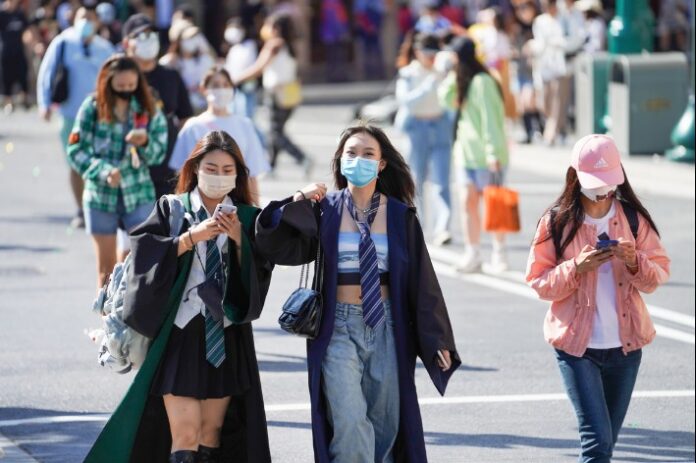People visit the Universal Beijing Resort in Beijing, Sept 20, 2022. [Photo/Xinhua]
China will tighten up tourism management during the approaching National Day holiday to prevent possible sporadic COVID-19 outbreaks.
Li Xiaoyong, deputy director of the market management department with the Ministry of Culture and Tourism, said at a news conference on Thursday in Beijing that the ministry will strengthen the tourism and cultural events management and the supervision of industry operators” health conditions to secure a smooth operation of the tourism market over the seven-day break. The holiday starts on Saturday and ends on Oct 7.
“Travel agencies and online travel platforms are not allowed to organize group tours for inbound or outbound travels, neither booking hotels nor flight tickets for group tours to overseas destinations,” he said. “Their services of organizing group tours to places with medium or high infection risks are also in suspension over the holiday, as well as the tours to border cities”.
He said travel agencies are required to limit group tours to a reasonable size during the holiday. Hotels and homestays should disinfect their places and check travelers’ health codes and nucleic acid test results – which should be a negative one done within 72 hours, before letting them check in.
He said that tourist attractions and places offering cultural events should also take travelers’ body temperature and check their nucleic acid test results at entrances.
“Tourism and cultural companies and operators should get to know their workers’ health conditions in time and improve their awareness of self-protection. Local authorities can perform more frequent nucleic acid tests to those culture and tourism workers, for example, every two days to secure a safer traveling environment. Tour guides should hold a negative test result within 48 hours when on duty,” he said.
Lei Zhenglong, an official from the National Administration of Disease Prevention and Control said at the news conference that the nation has performed more precise and strict epidemic containment measures to secure people’s health.
He said that the administration has required the local authorities to make reasonable plans to transfer people in close contacts with the confirmed cases and improve the facilities and living environment of the quarantine sites.
“The local authorities should also secure living supplies to the residents whenever a sporadic epidemic breaks out. Designated hospitals or medical institutes should be available to residents in areas with medium or high infection risks to facilitate their needs for medical services,” he added.










